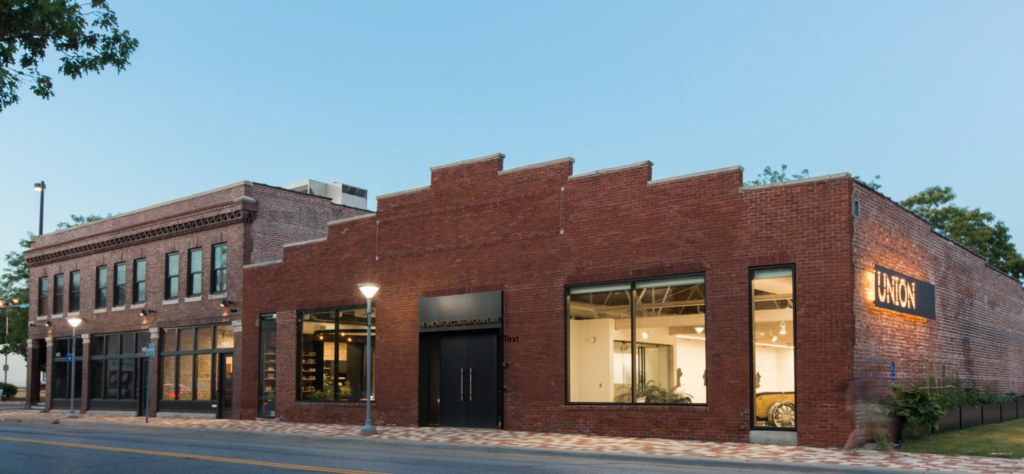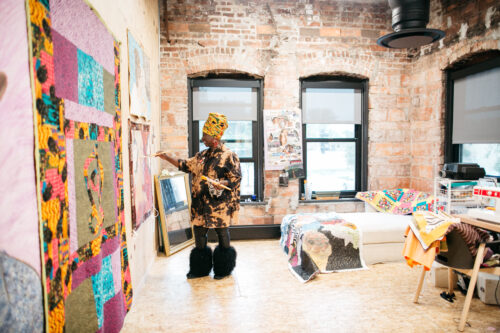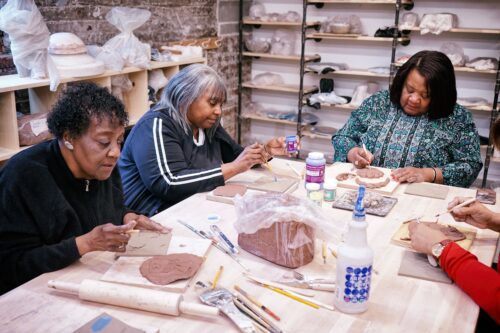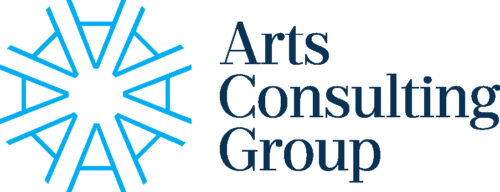Organization
The Union for Contemporary Art (The Union) is a community-based hub strengthening the cultural and social landscape of North Omaha, Nebraska, using the arts as a vehicle to inspire positive social change. Founded in 2011 by journalist and visionary arts administrator, Brigitte McQueen, The Union began programming in a 3,500-square-foot former food pantry on Burdette Street responding to the needs of the North Omaha artists and community members. Playing an anchor role in the revitalization of their North Omaha community, in 2017 and subsequently, in 2022, The Union renovated the historic Blue Lion Center and F.J. Carey Block buildings, the epicenter of entertainment and arts in North Omaha’s golden era of the 1920s - 1960s.

Today, The Union is a cornerstone for the development and presentation of artistic expression in its historic community. It is an economic driver in its North Omaha community that strengthens the cultural and social landscape by providing free and low-cost programs, equitable compensation for artists and The Union’s workforce, artist development and training for all ages, state-of-the-art facilities, and intentional investment and partnerships. Simultaneously, the organization works to center the arts within a larger critical conversation on how to collectively build a more just and liberatory society. Among its core values, The Union attests to the power of dialogue: “By nature, artists who seek to challenge the status quo – aesthetically, socially, politically – produce works that often agitate, unsettle, and disquiet our most closely held assumptions and beliefs. Inherent to The Union's commitment to fostering social change and promoting freedom of artistic expression is a firm belief in the power of dialogue. To this end, The Union for Contemporary Art invites challenging conversations between artist and audience while maintaining a supportive environment of equality and respect.”
Featured in Architecture Magazine, The Union’s state-of-the-art facilities include the Wanda D. Ewing Gallery; Co-Op Studios including ceramics, darkroom, digital design lab, fiber arts, and print shop; private studios for local artist fellows and studio/living space for national/regional artists-in-residence; offices, library, and community gathering spaces; youth engagement classrooms, studios, and commercial kitchen; and the Abundance Garden’s greenhouse, raised bed gardens and fruit orchard, compositing facilities, and outdoor classroom. The Shirley Tyree Theater features a 75-seat black box theater, set-design workshop, lobby, box office, rehearsal, and community gathering space enhancing The Union’s performing arts program.
Entering its second decade, The Union serves its mission through its dynamic programming and the exceptional talents and passion of its creative, diverse, and dedicated staff, board leadership, and community and funding partners. Part of the national cohort of the Wallace Foundation’s Arts Initiative, The Union leadership and staff are engaged in strategic planning that prioritizes staffing capacity and policies; growth and sustainability of programming; business-model strategy for long-term financial sustainability; succession planning; and expanding its national profile as a model for community-based cultural organizations serving artists of color.
From youth programming, a performing arts collective, and communal studio spaces, to an artist fellowship program, The Union’s programs nurture the creative practice of artists of diverse disciplines at all stages of their development. Exhibition programs showcase works by local and national artists, with an emphasis on the diversity of twenty-first-century experiences, and annually commission new works by women of the African diaspora. Co-Op Studios and Fellowship programs create opportunities for local artists to strengthen their creative and social practices offering access to space and resources to create. The Performing Arts program is dedicated to sharing productions that reflect authentic narratives about experiences within the African diaspora. Youth Engagement programs offer free access to the arts, including studio-based classes, for youth living in North Omaha. The Abundance Garden is a 6,500 sq. ft. garden, cared for by Union staff and neighborhood youth, growing and distributing 700 pounds of free produce each year. The Neighborhood Arts program is a community-focused mural initiative, connecting artists and North Omaha residents to create public works in North Omaha. The Populus Fund, in partnership with the Andy Warhol Foundation’s Regional Regranting program, distributes six $10,000 project grants to regional artists annually.


The Union is governed by an 11-member board of directors led by chair Shavonne Washington-Krauth, with Brigitte McQueen, founding Executive Director, overseeing a full-time staff of 19. For the fiscal year ending December 31, 2023, The Union anticipates total revenues of $2.6 million with 87% from Foundations/Trusts, 5% from Government grants, 2% from Corporate and Individuals, and 6% from Interest and Other Earned Revenue.
Sources: architectmagazine.com; u-ca.org
Community
Omaha, Nebraska is known as the gateway to the West, and North Omaha has a rich legacy as an influential and vibrant African American community uplifting activism, literature, and music. Omaha-born Malcolm X spent his first years of life in a home less than two miles from The Union. In the decades since the community has nurtured the roots of generations of grassroots leaders working for the liberation of an area frequently left under-resourced and segregated from the city surrounding it.
North Omaha has also sustained a rich cultural heritage. In the heyday of jazz, the intersection of North 24th and Lake Streets (where The Union is situated) was a destination for musicians traveling through the Midwest. Legends including Duke Ellington, Charlie Christian, and Gene Krupa performed in the neighborhood. Today, this vibrancy continues with The Union at the center of a revitalized artistic corridor. Within walking distance of The Union are multiple cultural organizations—The Great Plains Black History Museum, North Omaha Music and Arts, Culxr House, and Fabric Lab—each uplifting distinct aspects of history and the humanities in the community.
Annual events and festivals uniting community members and attracting visitors to the area include Native Omaha Days, the Fort Omaha Intertribal Powwow, Omaha Blues, Jazz, and Gospel Festival, and the annual Juneteenth Joyfest. The wider Omaha arts and cultural scene features a variety of contemporary art centers, museums, galleries, and cultural destinations, including the Bemis Center for Contemporary Arts, The Durham Museum, the Kaneko, Joslyn Art Museum, Kiewit Luminarium and the Henry Doorly Zoo and Aquarium. Outdoor enthusiasts enjoy parks and scenic trails along the Missouri River with the Bob Kerry Pedestrian Bridge, Lauritzen Gardens, Fontenelle Forest, and the 390-acre Cunningham Lake with fishing, boating, hiking, and camping. The historic Old Market District features shopping, dining, and nightlife with boutiques, galleries, family-owned restaurants, world-class steakhouses, and fine French dining.
Omaha is home to four Fortune 500 companies with a mix of public and private employers, including Berkshire Hathaway, CHI Health, First National of Nebraska, Mutual of Omaha, Nebraska Medicine, Offutt Air Force Base, Peter Kiewit and Sons, Inc., and Union Pacific Railroad. Eppley Airfield, just ten minutes from The Union and four miles from downtown Omaha, serves five million passengers annually with 200 daily flights including non-stop service to 31 of the nation’s busiest airports. Omaha has the highest number of millionaires per capita in the nation and its Public Schools serve more than 52,000 students.
The Omaha-Council Bluffs metropolitan area has a population nearing one million. Omaha’s cost of living is 8% below the national average whose population of 500,000 is 65% white, 12% Black, 14% Hispanic or Latino, 1% Native American, 4% Asian, and 4% two or more races. North Omaha’s more diverse population is 43% Black, 32% White, 13% Hispanic or Latino, 7% Asian, and 5% two or more races.
Sources: unomaha.edu; redfin.com; visitomaha.com; forbes.com; parks.cityofomaha.org; worldpopulationreview.com; census.gov
Position Summary
The Executive Director will be responsible for implementing The Union’s strategic goals and shaping the organization’s vision, serving as the primary external spokesperson for the organization. Cultivating authentic relationships in the community, regionally, and nationally, the Executive Director will expand The Union’s presence in the social justice and community arts education spaces locally and nationally, building financial support and brand awareness as a model for other communities. Collaboratively with senior leadership and the Board of Directors, the Executive Director will embrace and advance The Union’s programming and ensure the financial sustainability of the organization, leading through a lens of empowerment and driving equitable, inclusive, and accessible opportunities that align with the vision of The Union.
Roles and Responsibilities
Strategic Leadership and Communication
- Embody and champion The Union’s policies and practices of cultural equity that empower a just, inclusive, and equitable community.
- Provide inspirational and empowering leadership to all employees, especially the senior leadership circle, and assure the continued development and management of a professional, efficient, equitable, and sustainable organization.
- Cultivate a strong and transparent working relationship with the board, prioritizing its development and expansion.
- Nurture collaborative partnerships locally, regionally, and nationally that increase participation in The Union’s programs and events and expand financial support and visibility.
- Embrace other strategic leadership and communication responsibilities, as needed.
Community Engagement and Revenue Enhancement
- Serve as the lead spokesperson, communicating effectively and authentically with all internal and external constituents.
- Provide strategy to The Union’s fund development activities as a key fundraiser, working with the board and staff, cultivating and stewarding relationships with donors, and foundation and corporate partners.
- Leverage the networks of the board and partner organizations to maximize contributed revenue and sponsorship opportunities for The Union’s annual campaign, exhibitions, and programs.
- Maintain an accessible and familiar persona with The Union’s artists, students, patrons, partners, donors, and local community leaders, including regular attendance and engagement in programming and events.
- Ensure the flow of funds is allocated strategically and equitably to reflect present needs and future potential.
- Embrace other community engagement and revenue enhancement responsibilities, as needed.
Operational Excellence
- Provide day-to-day management and supervision of The Union’s staff and volunteers and encourage staff’s creative and professional development.
- Nurture and support a workplace environment that fosters employee engagement, a sense of belonging, and a high level of professional performance.
- Lead a robust human resources management process that includes an annual review of personnel job descriptions and compensation, performance reviews, and ongoing updates to the employee handbook.
- Oversee comprehensive marketing, branding, and development strategies collaboratively with staff leadership that will safeguard consistency throughout the organization.
- Embrace other operational excellence responsibilities, as needed.
Governance and Board Relations
- Build and empower a diverse and inclusive board, representative of the community, who are highly engaged and empowered to leverage and secure resources.
- Provide support to best utilize the board’s talents and The Union’s resources and partner with board members, committees, and advisory members to develop strategies that effectively mobilize and utilize stakeholders.
- Ensure the efficient and timely development and distribution of agendas and reports.
- Provide board members with clear and concise financial and programmatic reporting to inform decisions that advance the mission and goals of The Union.
- Attend quarterly board meetings, and executive committee and other committee meetings as needed, to facilitate the transparent flow of information.
- Assume primary responsibility for the preparation of the annual financial budget and operating plans, collaborating with the treasurer and the finance committee for full board approval and oversight.
- Engage and empower leadership staff in building direct relationships with the board through shared reporting responsibilities, and board engagement in programming.
- Embrace other governance and board relations responsibilities, as needed.
Traits and Characteristics
The Executive Director will be a dynamic, passionate, and altruistic leader who values teamwork and collaboration with others and is passionate about uplifting marginalized communities through their deep commitment to the arts. An active member of the community, they will be people-oriented, valuing interactions with a range of stakeholders, and comfortable networking across sectors (donors, government, education, grass-roots community) beyond the arts is a must.
A sound decision-maker, the Executive Director will be a versatile and resourceful leader with the ability to anticipate complex problems. Demonstrating leadership through consultation and consensus building with highly developed cultural competencies, the Executive Director will handle difficult situations with diplomacy and ease, remaining sensitive and responsive to the needs of others. The Executive Director will also possess leadership that promotes transparency with constituents, including the board, staff, artists, patrons, and external stakeholders.
Other key competencies include:
- Time and Project Management – The acuity to ascertain competing priorities, resolve difficulties, overcome obstacles, and maximize the use of time and resources to attain the desired outcomes.
- Personal Accountability – The ability to take responsibility, be accountable, listen and use feedback, and analyze data to learn from mistakes, possessing a high degree of awareness of the impact of personal actions and decisions.
- Diplomacy – The clarity to demonstrate emotional intelligence and sensitivity when handling challenging issues while communicating, building rapport, and relating well to others.
- Resiliency – The dexterity to quickly adjust to changing circumstances in the industry and environment with the flexibility to remain optimistic in the face of setbacks and challenges, recognizing these are part of learning and growth that informs new strategies and tactics.
- Leadership and Decision Making – The capacity to make consistently sound and timely decisions and to organize and inspire people to believe in a vision that centers on the well-being and growth of The Union’s artists, patrons, and community.
- Planning and Organizing – The capability to identify and oversee all resources, tasks, systems, and people to establish courses of action to ensure that work is completed effectively.
Qualifications
Qualified candidates will have seven to ten years of increasing responsibility in nonprofit administration. Prior executive-level experience with arts education and community-based organizations is ideal but not required. Significant experience and a proven track record of board development, fundraising, marketing, branding, and fiscal management are expected. Outstanding presentation and communication skills and the propensity to be a passionate spokesperson, relationship builder, and fundraiser are needed. A strong commitment to the professional development of staff and a successful track record of recruiting and retaining a diverse and inclusive team is essential.
Compensation and Benefits
The Union provides a competitive salary, with an anticipated starting salary range of $125,000 to $145,000 commensurate with experience. Benefits include health, medical, and dental insurance with The Union covering 80% of premiums; paid time off and parental leave policies; short- and long-term disability coverage; term life insurance; and matching 401(k) contributions with automatic 3% Union contribution.
Applications and Inquiries
To submit a cover letter and resume with a summary of demonstrable accomplishments, please click here or visit artsconsulting.com/opensearches. For questions or general inquiries about this job opportunity, please contact:
Renée Danger-James, Vice President
Delilah Norris, Senior Advisor

1040 First Avenue, Suite 352
New York, New York 10022-2991
Tel (888) 234.4236 Ext. 212 (Danger-James) or Ext. 230 (Norris)
Email TheUnion@ArtsConsulting.com
To support a full creative life for all, The Union for Contemporary Art commits to championing policies and practices of cultural equity that empower a just, inclusive, equitable community.
Cultural equity embodies the values, policies, and practices that ensure all people—including but not limited to those who have been historically underrepresented based on race/ethnicity, age, disability, sexual orientation, gender identity, socioeconomic status, geography, citizenship status, or religion—are represented in the development of arts programming; the support of artists; the nurturing of accessible, thriving venues for expression; and the fair distribution of financial and informational resources.
The Union for Contemporary Art recognizes that our work takes place on the ancestral homeland of the Umoⁿhoⁿ (Omaha) and Očhéthi Šakówiŋ (The Seven Council Fires) Nations. The colonial genocide and forced removal of these people remain an irrevocable part of the history of the land we now call home. The Union acknowledges this history and affirms the sovereignty of the thousands of native peoples still inhabiting, tending, and sanctifying this land. As an arts organization, The Union is committed to pursuing opportunities to support the creative and cultural light of the people who’ve made this land a home for countless generations.
Click here for the downloadable PDF.

